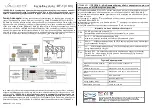MPC563XM Reference Manual, Rev. 1
Freescale Semiconductor
717
Preliminary—Subject to Change Without Notice
Chapter 23
Enhanced Time Processing Unit (eTPU)
23.1
Introduction
eTPU is an intelligent, semi-autonomous co-processor designed for timing control. Operating in parallel
with the Host CPU, the eTPU processes instructions, real-time input events, performs output waveform
generation, and accesses shared data without Host intervention. Consequently, for each timer event, the
Host CPU setup and service times are minimized or eliminated.
High-level assembler, compiler and documentation allows customers to develop their own functions on
the eTPU.
eTPU is an enhanced version of the TPU module. Although there is no compatibility at microcode level,
eTPU maintains several features of older TPU versions, making it easy to port older applications, at the
same time adding several features listed in
Section 23.1.2.2, “eTPU Enhancements over TPU3
This document also includes the new features belonging to the version of the eTPU known as eTPU2 . The
new features are summarized in
Section 23.1.2.3, “eTPU2 Enhancements over eTPU
eTPU architecture aims at high resolution timing capabilities. From a system perspective, high resolution
timing is limited by Host CPU overhead required for servicing timing tasks such as period measurement,
pulse measurement, pulse width modulated waveform generation, etc. On the eTPU, high resolution
timing is achieved by three main capabilities:
•
Reduced latency: pin actions are immediate.
•
Reduce or eliminate host interrupt service time.
•
Double action channel capability reducing the channel request rate.
eTPU provides higher resolution than the Host CPU can achieve and creates no Host overhead for
servicing timing tasks.
Latency is the interval from occurrence of an event to the start of event servicing. eTPU can service its
own events without interrupting the Host. There are two types of timing events:
•
Input pin transition.
•
Selected Time Base match, i.e., a selected Time Base counter reached or exceeded a
pre-programmed value
Service time is the time spent servicing an event. In general, in microcontrollers the service time is
constrained because the instruction set is not optimized for time function synthesis. The eTPU instruction
set is optimized, so that time functions can be implemented with much fewer instructions than the Host
CPU. Instructions execute faster, service time is reduced and program memory compacted.
Instructions executed by the eTPU are connected directly to the eTPU timing hardware and allow
parallelism of hardware related actions.


















